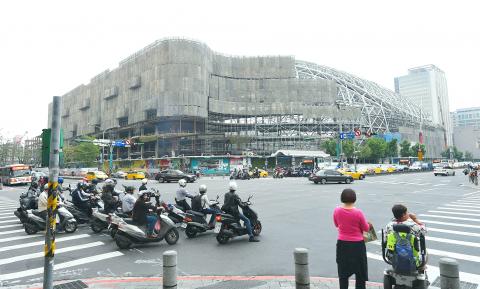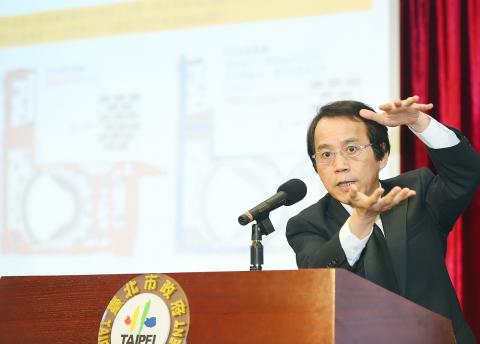Either the Taipei Dome (台北大巨蛋) or its neighboring shopping mall should be demolished, Taipei Deputy Mayor Charles Lin (林欽榮) said yesterday, as he presented the results of the city’s safety inspection commission into the Dome’s evacuation plans.
Computer analysis of the evacuation plans found that the construction of a large shopping mall adjoining the Dome would prevent the site from being evacuated within 15 minutes.
In addition to increasing the difficulty of evacuating the Dome itself, the city’s computer model found that the shopping mall would be difficult to evacuate, with exits remaining clogged a full hour after an evacuation began.

Photo: Chang Chia-ming, Taipei Times
Lin attributed the results to overbuilding on the construction site by contractor Farglory Land Development Co (遠雄建設), with the area occupied by buildings increasing from 46 percent in the initial plan put forward in 2004 to 54.5 percent at present.
“An area equal to five Sogos has been added to the complex,” Lin said, referring to the Taipei Pacific Sogo Department Store (太平洋崇光百貨) shopping mall. “Excessive additional building space has caused the Taipei Sports and Cultural Park to become highly dangerous and a potential disaster area.”
He said that the city’s analysis found that the open space surrounding the Dome complex could only hold 60,000 people, far fewer than the estimated 140,000 people who could be inside the buildings during an emergency.

Photo courtesy of the Taipei City Government
He added that the lack of space would also prevent fire trucks from attending a disaster at the site.
“The site design would crowd everyone onto [neighboring] Guangfu S Road and Zhongxiao E Road,” Lin said. “In that event, how can rescue operations be conducted?”
Lin said that while the city “respected” the Ministry of the Interior Construction and Planning Agency’s approval of site safety plans, it questioned whether a truly rigorous analysis had been conducted, given the lack of clear national standards for evaluating a structure as large as the Taipei Dome.

Photo: Chang Chia-ming, Taipei Times
He said Farglory had failed to conduct a comprehensive analysis of evacuation procedures for the entire complex, while setting an unrealistic evacuation objective of having all of the spectators out of their seats within eight minutes in a “preliminary” evacuation, compared with the 15-minute complete evacuation standard used in Japan.
Lin said that Farglory also incorporated other numerous problematic assumptions into their model, including failing to take into consideration the obstacle Dome seating would present to fleeing spectators.
He said the firm made an unrealistic calculation of how quickly fleeing spectators would be able to escape the structure and also inflated the amount of “open space” around the structure by incorporating stairways and failing to subtract space which would be needed for rescue operations.
While Farglory’s analysis only involves an “ordinary” evacuation, the city conducted an “emergency” analysis, he said.
Lin also cited the ease with which a fire could spread throughout the complex as a major concern, calling the two stories of parking beneath the site which connects the different buildings “unprecedented.”
A fire within the parking lot would be extremely difficult to reach and extinguish, while it could easily spread throughout the complex, he said.
Given the safety problems unearthed, the commission recommended that either the Dome itself or the neighboring mall should be demolished to provide more open space for an emergency evacuation, he said, adding that the site’s underground parking should also be sealed off.
The complex’s other buildings would be unaffected.
Lin declined to comment on the effect the city’s report would have on ongoing negotiations with Farglory, adding that the negotiations were the responsibility of a separate committee headed by Deputy Mayor Teng Chia-chi (鄧家基).
Teng refused to respond to reporters’ questions, instead releasing a statement saying that as long as there were public safety concerns the city would not allow the complex to begin operations.
The Taipei City Government launched a safety investigation into the Dome after Farglory refused to agree to demands for concessions during a renegotiation of the terms of the contract.
The Taipei Department of Sports said that the Taipei Gymnasium could serve as the main site for the 2017 Universiade if the Taipei Dome is unavailable.

PREPAREDNESS: Given the difficulty of importing ammunition during wartime, the Ministry of National Defense said it would prioritize ‘coproduction’ partnerships A newly formed unit of the Marine Corps tasked with land-based security operations has recently replaced its aging, domestically produced rifles with more advanced, US-made M4A1 rifles, a source said yesterday. The unnamed source familiar with the matter said the First Security Battalion of the Marine Corps’ Air Defense and Base Guard Group has replaced its older T65K2 rifles, which have been in service since the late 1980s, with the newly received M4A1s. The source did not say exactly when the upgrade took place or how many M4A1s were issued to the battalion. The confirmation came after Chinese-language media reported

A Ministry of Foreign Affairs official yesterday said that a delegation that visited China for an APEC meeting did not receive any kind of treatment that downgraded Taiwan’s sovereignty. Department of International Organizations Director-General Jonathan Sun (孫儉元) said that he and a group of ministry officials visited Shenzhen, China, to attend the APEC Informal Senior Officials’ Meeting last month. The trip went “smoothly and safely” for all Taiwanese delegates, as the Chinese side arranged the trip in accordance with long-standing practices, Sun said at the ministry’s weekly briefing. The Taiwanese group did not encounter any political suppression, he said. Sun made the remarks when

The Taiwanese passport ranked 33rd in a global listing of passports by convenience this month, rising three places from last month’s ranking, but matching its position in January last year. The Henley Passport Index, an international ranking of passports by the number of designations its holder can travel to without a visa, showed that the Taiwan passport enables holders to travel to 139 countries and territories without a visa. Singapore’s passport was ranked the most powerful with visa-free access to 192 destinations out of 227, according to the index published on Tuesday by UK-based migration investment consultancy firm Henley and Partners. Japan’s and

BROAD AGREEMENT: The two are nearing a trade deal to reduce Taiwan’s tariff to 15% and a commitment for TSMC to build five more fabs, a ‘New York Times’ report said Taiwan and the US have reached a broad consensus on a trade deal, the Executive Yuan’s Office of Trade Negotiations said yesterday, after a report said that Washington is set to reduce Taiwan’s tariff rate to 15 percent. The New York Times on Monday reported that the two nations are nearing a trade deal to reduce Taiwan’s tariff rate to 15 percent and commit Taiwan Semiconductor Manufacturing Co (TSMC, 台積電) to building at least five more facilities in the US. “The agreement, which has been under negotiation for months, is being legally scrubbed and could be announced this month,” the paper said,